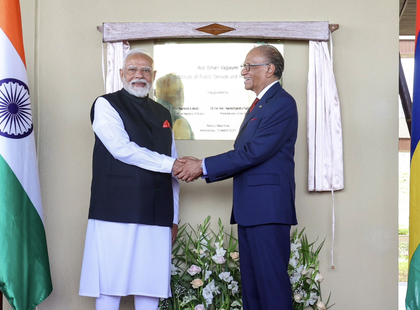PM Modi to meet Mauritian counterpart Ramgoolam in Varanasi today
By IANS | Updated: September 11, 2025 06:35 IST2025-09-11T06:34:17+5:302025-09-11T06:35:04+5:30
Varanasi, Sep 11 Prime Minister Narendra Modi will have bilateral talks with his Mauritian counterpart, Navinchandra Ramgoolam, in ...

PM Modi to meet Mauritian counterpart Ramgoolam in Varanasi today
Varanasi, Sep 11 Prime Minister Narendra Modi will have bilateral talks with his Mauritian counterpart, Navinchandra Ramgoolam, in his parliamentary constituency of Varanasi on Thursday.
At around 11.30 a.m. in Varanasi, PM Modi will host his Ramgoolam, who is on a state visit to India from September 9-16. The city is all decked up for the high-level meeting with elaborate arrangements and decorations.
The meeting in the ancient city of Varanasi will highlight the civilisational connect, spiritual linkages, and enduring people-to-people bonds that have long defined the special relationship between India and Mauritius.
During their bilateral discussions, the two leaders are expected to review the entire spectrum of cooperation, with particular emphasis on development partnership and capacity building.
They will also explore new avenues of collaboration in healthcare, education, science and technology, energy, and infrastructure, while giving special focus to renewable energy, digital public infrastructure, and the blue economy.
The upcoming talks build upon the positive momentum of Prime Minister Modi's state visit to Mauritius in March this year, during which India and Mauritius elevated their ties to an 'Enhanced Strategic Partnership'.
As a close maritime neighbour and valued partner in the Indian Ocean Region, Mauritius plays a pivotal role in advancing India's MAHASAGAR (Mutual and Holistic Advancement for Security and Growth Across Region) Vision and the 'Neighbourhood First' policy.
The partnership is also seen as an important contribution to the collective aspirations of the Global South.
The Varanasi Summit is expected to serve as a landmark in India–Mauritius relations, reinforcing their shared commitment to mutual prosperity, sustainable development, and a secure and inclusive future.
Earlier, on Wednesday, Ramgoolam expressed that the India-Mauritius partnership will last forever, saying that the island nation is the most reliable partner for India and there are huge business opportunities.
He called for further strengthening of historical, cultural and economic relations between India and Mauritius.
He was speaking at the business conclave here, which was attended by Union Minister of Power and Urban Affairs, Manohar Lal Khattar, and heads of various industry groups.
Earlier, Ramgoolam had visited India in 2014, as the only non-SAARC leader invited to attend the swearing-in ceremony of PM Modi and the Council of Ministers.
In a press release, the MEA stated, "India and Mauritius share a close and special relationship rooted in shared historical, cultural and people-to-people ties. As India's key maritime neighbour in the Indian Ocean Region, Mauritius holds a special place in India's Vision MAHASAGAR (Mutual and Holistic Advancement for Security and Growth Across Region) and the 'Neighbourhood First Policy' and is a key partner in the Global South."
The ministry said that the Mauritian PM's visit to India, following the visit of PM Modi to the East African nation in March 2025, will advance the "strong and enduring bonds" between the two countries.
PM Modi went to Mauritius in March for a two-day State visit at the invitation of Ramgoolam to attend the country's 57th National Day celebrations.
During the visit, he held a bilateral meeting with Ramgoolam and Mauritian President Dharam Gokhool.
Mauritius was one of the handful of important countries with which independent India established diplomatic relations in 1948, even before the independence of Mauritius.
The relationship has been characterised by a high level of trust and mutual understanding at the leadership level and continued high-level political engagement, according to the MEA.
Disclaimer: This post has been auto-published from an agency feed without any modifications to the text and has not been reviewed by an editor
Open in app